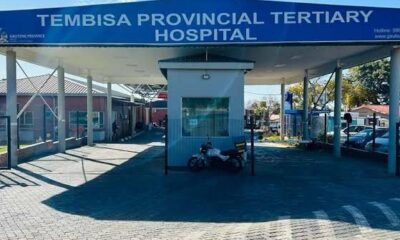News
‘Nothing to Lose’: South African Doctors Turn on Union Amid Healthcare Crisis

Junior doctors speak out as they face mass unemployment, crushing overtime, and silence from Samatu
A rising tide of discontent is swelling within South Africa’s healthcare system. Over 1,000 doctors, from interns to specialists, are breaking ranks and turning their frustration toward the very organisation meant to represent them: the South African Medical Association Trade Union (Samatu).
At the heart of the backlash is a chilling message from doctors who say they feel overworked, undervalued, and abandoned, both by the state and their official trade union.
The crisis reached boiling point on 26 May, when 126 doctors from more than 40 institutions—public and private—issued an open letter to Samatu General Secretary Dr Cedric Sihlangu, demanding urgent intervention into what they describe as an exploitative, collapsing healthcare system.
“We Are Not Machines”
The letter paints a harrowing picture: public-sector doctors working up to 170 hours of overtime a month, often unpaid. Posts remain frozen. Specialist services are being gutted. And morale, say doctors, has hit historic lows.
“You call for dialogue,” the letter reads, “but dialogue with whom? With the very state that… now discards its doctors like broken tools?”
In stark terms, the doctors accuse government and political elites of deliberately hollowing out the health system under the guise of austerity, turning healthcare into a profit-driven machine that protects political capital and exploits labour.
Samatu Shrugs Off the Uprising
In response, Samatu dismissed the open letter as unrepresentative, saying only 15 of the 126 signatories are union members.
“Samatu will always represent doctors on matters of collective concern,” said Sihlangu, “but these kinds of complaints should come from our members.”
The union defended its track record, claiming it had intervened on issues like commuted overtime cuts in Limpopo and Gauteng, even securing a temporary suspension of proposed changes after meeting with the Gauteng Department of Health.
But for doctors like Dr Simon Spoor, a public health clinician and one of the movement’s spokespeople, the union’s actions have fallen short of what’s needed in a collapsing system.
“What kicked this off was frustration. Samatu’s silence is deafening. Many of us feel they’ve become a ceremonial union—out of touch and out of reach.”
A Broken System, Not Broken Workers
The doctors argue that the system itself is the problem, not a handful of facilities or individuals.
One doctor from the Eastern Cape said general practitioners are now covering specialist services like urology and ophthalmology, often without additional training or compensation. Over weekends, some hospitals reportedly refuse to admit patients due to lack of on-call specialists causing avoidable deaths and dangerous treatment delays.
Another junior doctor described being chastised by HR for raising concerns about unpaid overtime, while juggling clinical work, academic obligations, and mental burnout.
“I am human too,” the doctor said. “I’m not just a doctor I’m exhausted, I’m studying, and I’m being guilt-tripped for not working for free.”
Challenging the NHI, Demanding Accountability
The collective also slammed the current model of the National Health Insurance (NHI) Act, describing it as “a pipeline for centralised corruption, dressed up in the language of justice.”
They called for a reimagining of union representation one grounded in grassroots democracy, real-time accountability, and an inclusive approach that bridges the gap between unemployed and employed healthcare workers.
Their demands include:
-
Elected leadership accountable to the rank and file;
-
One unified movement for all doctors;
-
Real, coordinated action—not symbolic resistance;
-
Acknowledgement that the system isn’t broken, but engineered to serve political and capitalist interests.
Spoor says they are already laying the groundwork for a new voluntary association, which could eventually become a new, fully-fledged doctors’ union.
The System Is Grinding Us Down
The growing collective continues to organise via WhatsApp, with over 1,000 active members, many of whom share horror stories anonymously to avoid professional retaliation.
Doctors say they’ve had enough of being gaslit by the system and by leadership that seems out of touch.
“After 10 years in the public sector,” Spoor says, “I’ve never seen morale this low.”
Their fight, Spoor insists, isn’t just for better working conditions, it’s for the patients left waiting, suffering, and dying in under-resourced hospitals.
With rising overtime expectations, diminishing resources, and no clear path to permanent employment for many junior doctors, the anger in South Africa’s medical community is beginning to calcify into organised action.
Whether or not Samatu chooses to listen, a new generation of health professionals appears ready to take matters into their own hands with nothing left to lose, and everything still worth saving.
{Source: Daily Maverick}
Follow Joburg ETC on Facebook, Twitter , TikTok and Instagram
For more News in Johannesburg, visit joburgetc.com



























